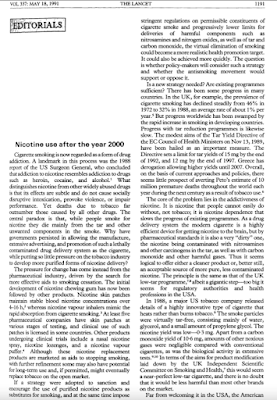Thus it seems logical to offer either a cleaner product or, better still, an acceptable source of more pure, less contaminated nicotine.
There is no good reason why a switch from tobacco products to less harmful nicotine delivery systems should not be encouraged. Smoking-related deaths after the year 2000 would fall steadily and substantially of this can be achieved. There is no compelling objection to the recreational and even addictive use of nicotine provided it is not shown to be physically, psychologically, or socially harmful to the user or to others.
Nicotine is in itself very harmful
The RIVM has determined that nicotine pouches contain harmful amounts of nicotine.
Nicotine is an acutely toxic substance that is rapidly absorbed by the body, whether administered through the skin, by mouth or when inhaled. Use of a large amount of nicotine can lead to acute nicotine poisoning, sometimes fatal.
The public health of young people in particular is at stake. The government believes that more children should grow up in a smoke and tobacco-free environment. In such an environment, young people are protected against tobacco smoke, nicotine addiction and the temptation to start smoking. This also means that they do not come into contact with nicotine products without tobacco.
The use of snus is prohibited in places where smoking is prohibited. It is difficult for those who have to ensure that the smoking ban is observed to determine whether someone is using snus or a nicotine pouch. This also applies to the Dutch Food and Consumer Product Safety Authority (hereinafter: NVWA) who must ensure that the smoking ban is enforced by the manager of that location. Bringing nicotine pouches under the smoking ban also improves the enforceability of the smoking ban on this point. Furthermore, it is not in line with the aim of a smoke-free generation that there are products on the market (that are not a smoking cessation medicine) that can be used to maintain a nicotine addiction in places where smoking is not allowed. This would defeat one of the purposes of introducing a smoking ban, which is to encourage smokers to stop smoking.
It is difficult to know where to begin with the stupidity of this paragraph. It is unsurprising that a ban on the use of a product that is kept under the top lip is almost impossible to enforce, but it is not obvious why banning another product that can be concealed just as easily will make the ban any easier to enforce. A more logical response would be to remove snus from the ban.
We all know that smoking bans were designed to make smokers' lives harder, but it's rare to hear a government say the quiet part out as loudly as it does here. The ostensible aim of 'smoke-free laws was to 'protect' staff from secondhand smoke. Similarly, the aim of a 'smoke-free generation' policy was to have a generation of people who don't smoke, not to have an entire nation of obedient citizens who don't use nicotine in any form. The goalposts are now overtly shifting. It's almost as if prohibitionists will take a mile if you give them an inch.
Moreover, from a practical health perspective, having safer nicotine products will advance the goal of having fewer people smoking, not hinder it. The government completely ignores this. None of its documents mention the potential for adult smokers to switch to pouches.
It is sheer puritanism and it will spread around the world unless this senseless authoritarian juggernaut is brought to a halt. The Dutch government is consulting on these proposals until 16 January. The consultation webpage is here in Dutch and here in English. I'll be giving them some comments. I hope you will too.



No comments:
Post a Comment